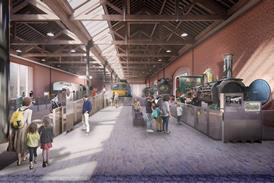- Home
 City of London to appoint architect to design firearms training facility for City police
City of London to appoint architect to design firearms training facility for City police Carmody Groarke gives preview of its revamped Manchester museum ahead of summer reopening
Carmody Groarke gives preview of its revamped Manchester museum ahead of summer reopening TP Bennett’s rethink on Canada Water scheme set to be approved next week
TP Bennett’s rethink on Canada Water scheme set to be approved next week What’s stopping us from better understanding our emissions?
What’s stopping us from better understanding our emissions?
- Intelligence for Architects
- Subscribe
- Jobs
- Events

2025 events calendar Explore now 
Keep up to date
Find out more
- Programmes
- CPD
- More from navigation items
Champagne pops as Cork House team wins RIBA Research Award

Bartlett dominates 2019 awards, with Tania Sengupta scooping President’s Medal
The team responsible for the Stirling Prize-shortlisted Cork House has won a RIBA Research Award for its work on dry-jointed bio-renewable construction using expanded cork blocks and engineered timber.
Oliver Wilton, of the Bartlett School of Architecture, and Matthew Barnett Howland, of CSK Architects, were recipients of the 2019 President’s Award – in the design and technical category – for their Cork Construction Kit.
The pair have spent five years looking at the potential for developing a viable construction system with outstanding performance using plant-based materials, as well as creating buildings with “exceptionally low whole-life carbon emissions” in the process.
…
This content is available to registered users | Already registered?Login here
You are not currently logged in.
To continue reading this story, sign up for free guest access
Existing Subscriber? LOGIN
REGISTER for free access on selected stories and sign up for email alerts. You get:
- Up to the minute architecture news from around the UK
- Breaking, daily and weekly e-newsletters
Subscribe to Building Design and you will benefit from:

- Unlimited news
- Reviews of the latest buildings from all corners of the world
- Technical studies
- Full access to all our online archives
- PLUS you will receive a digital copy of WA100 worth over £45
Subscribe now for unlimited access.


